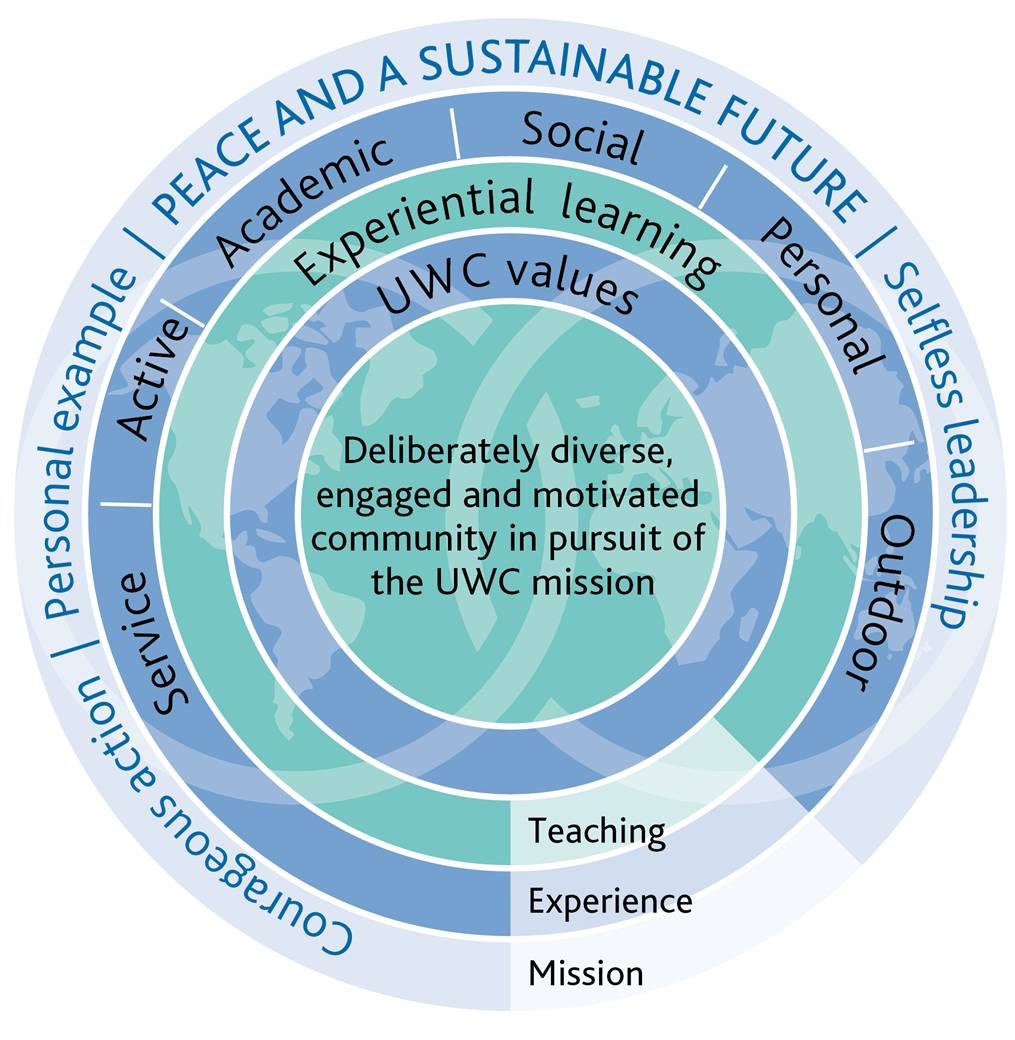اصول و قالب آموزشی
“There is more in us than we know if we could be made to see it; perhaps, for the rest of our lives we will be unwilling to settle for less.”
Kurt Hahn, Founder of UWC
At the heart of UWC’s distinctive model of education is deliberate diversity. Extending across the entire community, this is a vital component to every UWC school and college. All students will benefit from learning in a diverse environment that helps to broaden their mind and sense of self - alongside gaining an internationally recognised qualification.
بطن مدل آموزشی UWC گوناگونی آگاهانه است. این مدل متمایز از دیگر سیستم های آموزشی در سرتاسر مدارس UWC به کار گرفته شده و مولفهای حیاتی از در همهی مدارس UWC است. یادگیری در محیطی گوناگون تمامی دانشآموزان را نه تنها از کیفیت آموزشی بالا و جهانی بلکه از وسعت ذهنی و خودآگاهی نیز برخوردار میکند.
We help students discover the possibility of change. They learn that they can help to change the world through their courageous action, personal example and selfless leadership. We support young people to reach their intellectual, moral, aesthetic, emotional, social, spiritual and physical potential.
ما دانشآموزان را کمک میکنیم تا در امکان تغییر را دریابند. آنها نحوه کمک به تغییر در دنیا را با اقدامات شجاعانهی خود، نمونه گرایی و رهبری نوعدوستانه میآموزند. ما جوانانی که میخواهند به بالاترین توانایی فکری، اخلاقی، اجتماعی، روحی، و بدنی خود دست یابند حمایت میکنیم.

What students learn is guided by seven principles, which represent our commitment to educating the person as a whole. They are underpinned by the pursuit of peace, sustainability and social justice, our founding aim.
آنچه دانش آموزان UWC میآموزند بر اساس ۷ اصل برنامهریزی شده اند که بیانگر تعهد ما را به آموزش هر فرد به صورت جامع میباشد. این اصول برای دستیابی به صلح، پایایی و عدالت اجتماعی به عنوان اصول اساسی UWC پیریزی شدهاند.
۱- آموزش باید در محیط گوناگون مدرسه صورت پذیرد. دانشآموزان از مناطق و گروههای اجتماعی مختلف انتخاب میشوند تا بازتابی از انواع تنش های موجود میان مردم باشد.
- Education should take place within a diverse college community. Students should be selected from regions and social groups that reflect the wide range of tensions among and between people.
۲- آموزش نیازمند ترویج فعالانه فهم بینِ فرهنگی و رشد توجه واقعی به دیگران است. این دو بر اساس تجربهی مشترک زندگی با دیگران و همکاری و کمک به یکدیگر در محیط زندگی میتواند حاصل شود.
- Education requires active promotion of intercultural understanding and the development of genuine concern for others, founded on shared life experiences, and cooperative and collaborative living. This includes talking about and engaging with global issues in the pursuit of peace.
۳-
- Physical fitness and a healthy lifestyle are integral to developing a balanced person. Unhealthy lifestyles limit human potential.
- Community interaction is at the heart of college/school life. This requires the full and active participation of all members of the school or college.
- Students should be able to take positive action around issues of sustainability on both an institutional and individual level.
- Students must have opportunities to practice personal initiative, self-discipline and responsibility, and to manage risk and embrace challenges. Where appropriate, these opportunities need to be supported by a reassuring adult presence.
- Recognition is given to the fact that individuals possess unique talents and abilities. Programmes should exist in each school/college which help students fulfil their potential.
All of our schools and colleges share the UWC mission and values, but each operates differently, with a distinct local and regional identity. The UWC educational model provides a common framework within which all of our schools and colleges operate. It does not set down a curriculum but focuses on what is unique about UWC’s approach to education.
